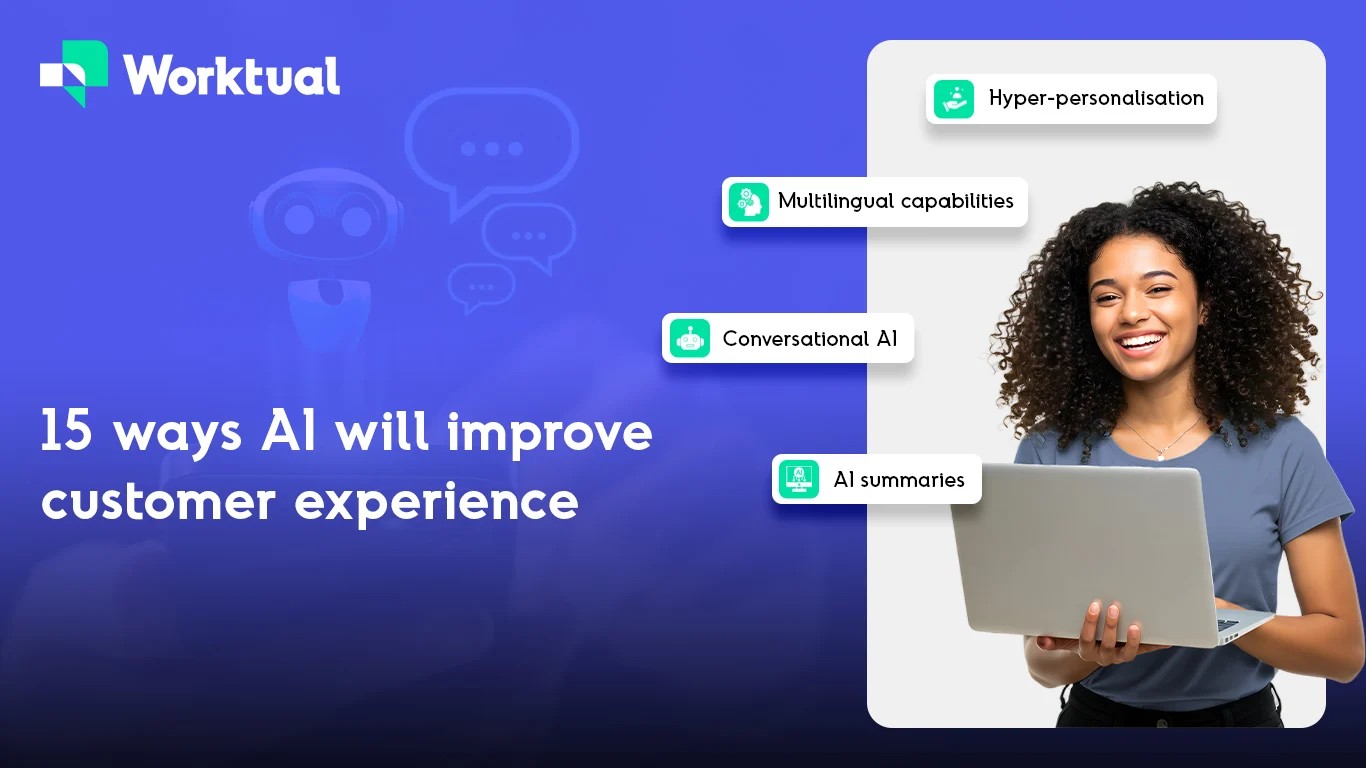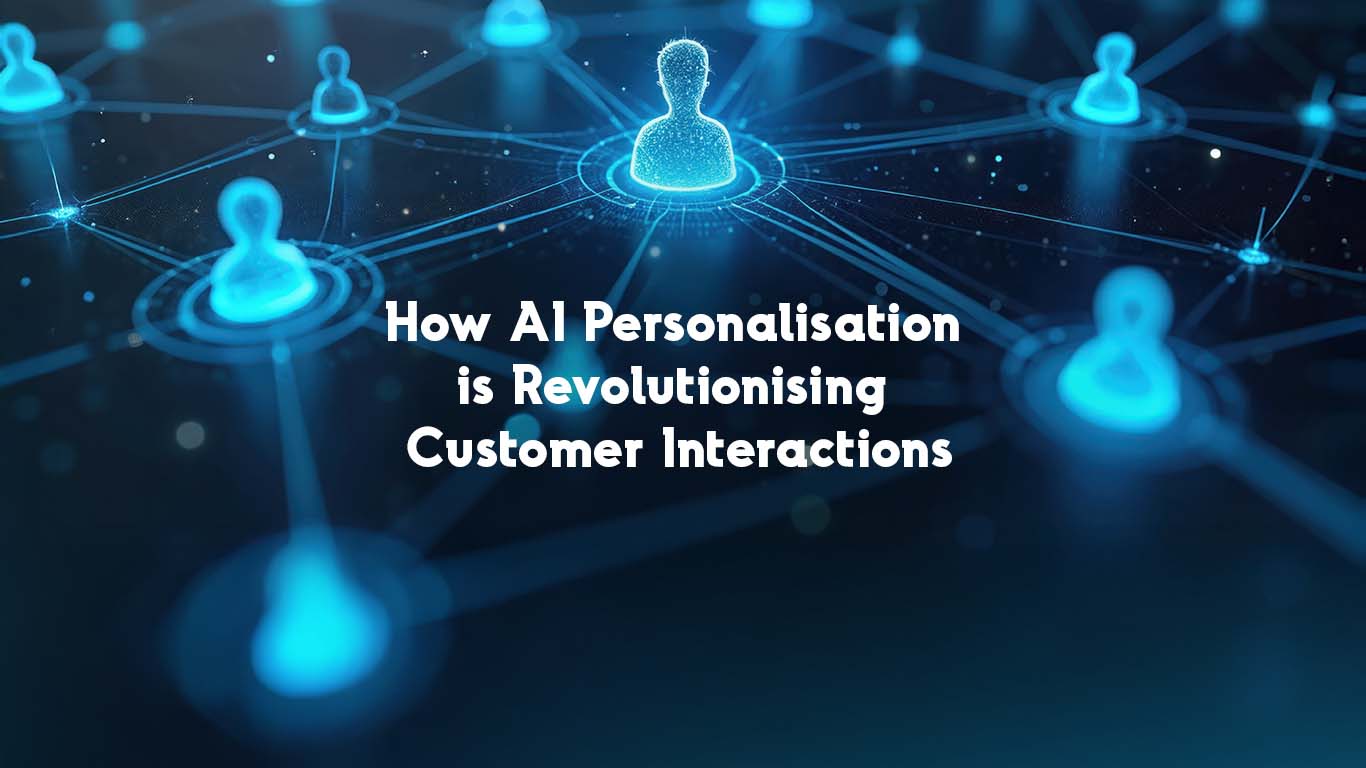15 ways AI will improve customer experience in 2026
Insights / 15 ways AI will improve customer experience in 2026

Meeting expectations = satisfied customers. Sounds simple, right? In reality, it’s anything but simple.
Over half of consumers feel increasingly stressed and exhausted when dealing with customer support, according to Businesswire.
The frustration stems from language barriers, repetitive conversations, multiple transfers, and the inability to get quick resolutions. And it’s only getting harder—61% of consumers say their customer service expectations have increased over the past year.
The bar isn’t just rising, it’s sky-high. Relying on traditional tools to keep up is no longer viable. Fortunately, AI agents have arrived just in time to rethink how businesses communicate with customers, offering faster, more personalised, and seamless experiences at scale.
Keep reading to understand AI agents and discover how they benefit you in crafting memorable customer experiences.
What are AI agents?
An artificial intelligence (AI) agent is a program or system that can autonomously carry out tasks on behalf of a user, without human supervision, by configuring its workflow and utilising other tools.
While AI agents can talk like humans, they are not limited to Natural Language Processing. They can solve customer problems, make decisions, and connect to other tools to send email reminders or WhatsApp messages with personalised offers.
What is an AI customer experience?
Simply put, it’s the practice of using AI technologies, such as large language models, machine learning, digital agents, and chatbots, to provide faster and efficient solutions that are proactive and personalised at scale. An AI customer experience utilises these tools to enhance the productivity of customer-facing teams, enhance the customer experience, and reduce costs. AI ad generators can also tailor marketing content in real-time, optimizing customer engagement and targeting with precision
15 ways AI will improve customer experience
1. Seamless multilingual communication
You face a lot of challenges while going global. From complying with local regulations to navigating language barriers to understanding cultural differences, to completing market research, your horizon is filled with challenges.
While settling into international markets, the worst thing you could ask for is your customers ranting on social media and jeopardising your brand. So offering support in multiple languages becomes both difficult and crucial.
AI-powered customer experience tools bundle Large Language Models (LLMs), Machine Learning (ML), and Natural Language Processing (NLP) algorithms. Therefore, speaking with customers in their native language at scale is no longer a tiresome task. Along with multilingual capabilities, these tools are designed to understand cultural nuances and deliver holistic support.
2. Voice AI tackling complex queries
Virtual assistants or AI voicebots give your support agents a breathing space, as they can handle complex queries just like a human. Using speech recognition and NLP, these AI voice agents answer customer queries, guide through troubleshooting steps, schedule appointments, and automate tasks. As a result, it provides more convenience to your business and a personalised customer experience.
3. Hyper-personalised solution recommendation
Cater to e-commerce visitor needs by simply integrating the AI-powered CX suite with your tech stack. Now, the tool can understand each user based on their shopping habits, choices, frequency, and more.
Studies show that 63% of consumers are open to product recommendations from service agents, reported Businesswire.
AI chatbots and virtual assistants use customer data to suggest relevant content and products, personalise deals, and create tailored experiences. As a result, customers feel like they’re having a realistic conversation with an actual agent and not a bot. By proactively addressing visitors’ needs, you enhance the overall customer experience.
4. Prevent mishaps from becoming social media rants
Not only product suggestions, but the AI-powered tool can predict customer concerns before they turn into issues. For instance, if a product is delayed for delivery, it proactively informs the customer and offers discount coupons for their next order, ensuring their satisfaction.
While doing so, it also analyses sentiment and detects the mood of the user. Unlike traditional chatbots, it automatically starts crafting empathetic messages and assures the visitor that it will provide a solution to their problem.
Businesswire reported that nearly half of consumers say that helpful and empathetic agents are what matters the most when they want to resolve a customer service issue.
5. Strengthen knowledge management systems
A report by IBM found that businesses using “AI-infused virtual agents” can reduce customer service costs by up to 30% while improving customer satisfaction and loyalty.
Encourage your customers to self-serve by using chatbots and your knowledge base to solve problems easily. AI chatbots enabled with knowledge bases and FAQs free up agents as they can answer regular and complex queries without human intervention.
In fact, IBM used its self-service AI platform, “Watson Assistant,” to handle routine customer queries. This move helped IBM reduce call centre traffic by 40% and saved costs.
6. Smart autonomous scheduling
AI chatbots simplify appointment or reservation bookings, as customers want to engage directly with a business without worrying about either side’s availability. They don’t have to deal with IVRs, call queues, or waiting for your email reply. They can simply check available slots and book an appointment independently through your website chat.
In hospitality, AI chatbots integrated with scheduling systems provide a seamless self-serve option for tasks like booking a table anytime. This flexibility delivers a great customer experience by streamlining operations, ultimately saving time, improving turnout, and enhancing customer satisfaction.
7. Create special deals for your customers
You feel good when you get special discounts on products that were on your wishlist for a long time, and AI makes these delightful moments a reality. Using customer data like order history, product searches, and demographic details, you can create targeted campaigns for cross-selling, reducing cart abandonment, depending on the individual’s behaviour with your business.
This kind of campaign automation adds a layer of stickiness around your brand when you work on a rewards program or birthdays, and strengthens brand loyalty.
8. Instant interaction summaries for real-time assistance
AI-generated summaries allow your agents to understand past conversations at a glance. Gone are the days of reading long chat histories. Now, agents get a short recap of key details such as, issues and resolutions.
These summaries are consistent when customers speak to different agents. As it highlights issues and resolutions provided, agents avoid repeating questions. This capability makes answering customers with personalised answers sound easy. Also, it makes customers feel valued and understood, without asking them to repeat. As a result, you improve the overall service quality and customer experience.
9. Streamline repetitive workflows
Remove human involvement from handling routine tasks, such as answering FAQs, email management, and data entry. Next-gen AI tools excel at these tasks, helping you streamline operations and freeing your agents to provide more personalised attention, thereby enhancing the customer experience.
In other words, AI automation allows you to focus on activities that reward human expertise, like sales, marketing, and live support.
Furthermore, AI assists your agents during higher-value interactions by fetching details from the knowledge base, minimising manual error, and improving accuracy. As a result, your agents are at their best while delivering faster resolutions to customers.
10. Scale personalised experiences effortlessly
With the advent of AI, businesses can create a customised customer journey tailored to every contact in your CRM by processing vast amounts of user data.
You can create ideal customer profiles that work for channels like social, website, and SMS, based on the user data, with the help of AI. Beyond simple product recommendations, AI helps your brand deliver personalised experiences across all touchpoints. This segmentation ensures consistency, no matter how or where customers chat.
AI-driven segmentation and personalisation enhance various business areas, including marketing campaigns, customer support, and sales conversions. It automates conversations, providing relevant and meaningful experiences to multiple customer segments without requiring manual input from agents.
11. Optimise workforce operations
According to a Forrester report, 40% of customer experience leaders plan to increase their overall CX investments above inflation in the next 12 months. Many businesses are planning to adopt AI-driven contact centre solutions to enhance operational efficiency.
AI contact centre solutions streamline call distribution, deliver data-driven insights, and help stakeholders improve the quality of customer support. Predictive AI-powered forecasting helps with call volume projects by analysing historical data, common customer queries, and placing the right number of agents in the right locations.
Automated scheduling saves time, while real-time tracking allows your team to help struggling agents and gain visibility into agent activity.
12. Strengthen customer loyalty and retention
Leveraging AI capabilities by connecting it to your tech stack gives you more engaged and loyal customers. For example, you can deliver a personalised experience with the help of customer-facing tools like AI chatbots. Simultaneously, you can also get feedback from customers during your interactions, if needed.
Over time, this builds brand trust, making customers feel valued, which strengthens engagement and loyalty. By analysing behaviours, you can identify trends and predict future needs. This enables you to tailor services to align with shifting customer expectations.
This data-driven approach ensures responsive engagement and support, allowing businesses to focus on customer satisfaction.
13. Leverage predictive analytics for smarter insights
Order history, customer queries, and other engagements on promotional email threads act as valuable inputs for AI engines to identify patterns and trends. Now, you can understand the market trends and predict future customer requirements and find ways to deliver a better customer experience.
- Demand projection
- Spotting bestsellers
- Understanding customer preferences
- Trend prediction
- Preventing potential problems
14. Continuously refine AI agent performance
Optimising AI agents with new data, agent interactions, and an updated knowledge base makes them more accurate, responsive, and effective. When you focus on refining the conversation flows such that it helps the AI agents to understand the user intent, you make way for smoother, human-like interactions to happen.
Data points that help you optimise in the right direction are: CSAT score and task completion rates. When you focus on these metrics, you can make the AI agent more responsive and personalised. Advanced analytics allow you to spot issues early, minimising frustration and enhancing customer engagement.
15. Maximise operational efficiency and cost savings
When you use AI for customer experience, you get to automate and streamline different tasks. As a result, you cut costs, increase efficiency, and ensure human expertise goes into completing high-value tasks.
A recent study found that 54% of businesses saw increased efficiency and reduced costs after implementing AI. Here’s how AI tools can save time across functions:
Marketing: Create high-quality content that feels like human-to-human interaction with the help of generative AI.
Sales: Strengthen the accuracy and efficiency of lead segmentation and scoring.
Support: Reduce ticket volume and resolution times using conversational AI chatbots.
Operations: Prevent out-of-stock scenarios on your e-commerce store with AI inventory optimisation.
Redefining customer experience with AI: Smarter, faster, more human
Customer expectations are soaring, and keeping pace with traditional methods leads to inefficiency. AI agents help businesses deliver personalised support and remove frictions, so they improve customer satisfaction.
Empower your customer-facing team, optimise workflows, and build customer trust at scale by adopting AI contact centre solutions.
It’s time to see beyond traditional methodologies and tools. Hold meaningful, empathetic conversations 24/7 with Worktual.
Related Posts

How AI Personalisation is Revolutionising Customer Interactions
Struggling to keep up with evolving customer expectations? You’re not alone. Customers demand personalised experiences, quick responses, and seamless interactions across touchpoints. As traditional marketing and customer engagement strategies couldn’t fulfil this expectation, businesses are unable to close deals, and frustrated customers are switching to competitors.

Top 5 AI Contact Centre Providers for Customer Service in 2026
When information’s scattered across systems, your agents can’t give quick answers. And your customers? They’re stuck waiting on hold. Again. It’s frustrating for everyone.

How Conversational AI Agents Work: NLP, ML, and Context Explained
Most visitors leave your website without a word because their questions don’t get tailored answers. As forms and FAQs can’t help much, potential leads simply walk away.
